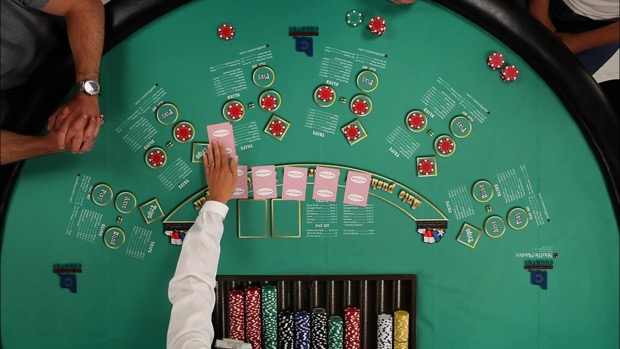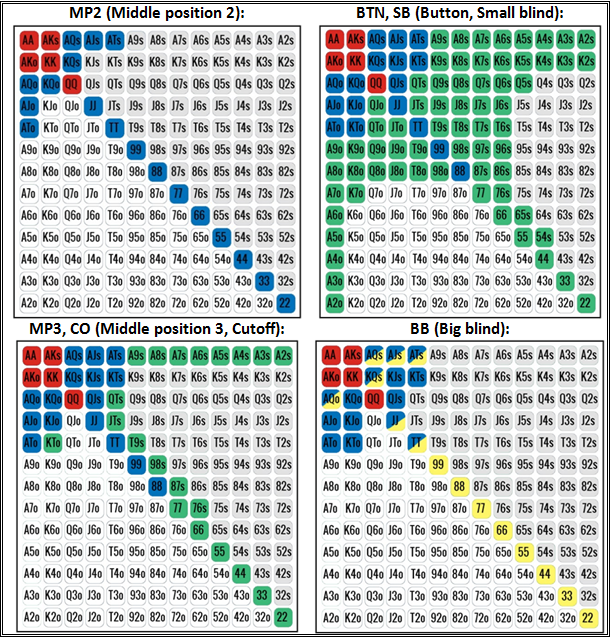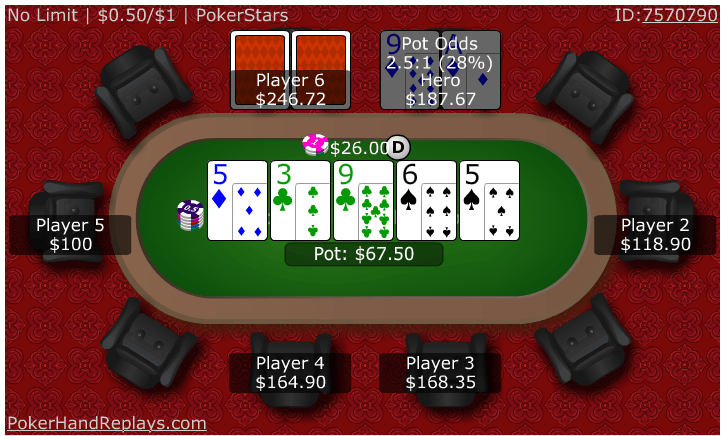- PokerListings.com's Poker Odds Calculator is the fastest, most accurate and easy-to-use poker odds calculator online. It's just like what you see when you watch poker on TV. Use it in real-time to know exactly what your chances of winning and losing are at any point in a poker hand – be it on online poker sites or playing live poker.
- Online real-time Poker Odds Calculator helps you win more poker hands when you play Texas Hold'em poker. Poker Indicator supports more than 200 online poker sites. ' ACR's highly successful $6 Million Venom is done but there's much more coming in 2020: For an encore, Americas Cardroom hosted a $6 Million Venom tournament, which just wrapped up.
- Poker Starting Hands Odds Calculator Chart
- Poker Starting Hands Odds Calculator Free
- Poker Starting Hands Odds Calculator
- Poker Starting Hands Odds Calculator Yahoo
The Poker Odds Calculator will help you calculate your chances on a given hand, in any situation. One of the most interesting features of the PokerNews Poker Odds Calculator is the guide on the. So the probability the CO holds a K is 32/159 = 0.20. We have to ignore a second order effect here which is that the specific combo that CO holds impacts the combos BTN can hold, but to a first order approximation it's reasonable to also assign BTN a 0.20 probability of holding a K.
Ever wondered where some of those odds in the odds charts came from? In this article, I will teach you how to work out the probability of being dealt different types of preflop hands in Texas Holdem.
It's all pretty simple and you don't need to be a mathematician to work out the probabilities. I'll keep the math part as straightforward as I can to help keep this an easy-going article for the both of us.
- Probability calculations quick links.
A few probability basics.
When working out hand probabilities, the main probabilities we will work with are the number of cards in the deck and the number of cards we want to be dealt. So for example, if we were going to deal out 1 card:
- The probability of dealing a 7 would be 1/52 - There is one 7 in a deck of 52 cards.
- The probability of dealing any Ace would be 4/52 - There four Aces in a deck of 52 cards.
- The probability of dealing any would be 13/52 - There are 13 s in a deck of 52 cards.
In fact, the probability of being dealt any random card (not just the 7) would be 1/52. This also applies to the probability being dealt any random value of card like Kings, tens, fours, whatever (4/52) and the probability of being dealt any random suit (13/52).
Each card is just as likely to be dealt as any other - no special priorities in this game!
The numbers change for future cards.
A quick example.. let's say we want to work out the probability of being dealt a pair of sevens.
- The probability of being dealt a 7 for the first card will be 4/52.
- The probability of being dealt a 7 for the second card will be 3/51.
Notice how the probability changes for the second card? After we have been dealt the first card, there is now 1 less card in the deck making it 51 cards in total. Also, after already being dealt a 7, there are now only three 7s left in the deck.
Always try and take care with the numbers for future cards. The numbers will change slightly as you go along.
Working out probabilities.
- Whenever the word 'and' is used, it will usually mean multiply.
- Whenever the word 'or' is used, it will usually mean add.
This won't make much sense for now, but it will make a lot of sense a little further on in the article. Trust me.
Probability of being dealt two exact cards.
Multiply the two probabilities together.
So, we want to find the probability of being dealt the A and K. (See the 'and' there?)

- Probability of being dealt A - 1/52.
- Probability of being dealt K - 1/51.
Now let's just multiply these bad boys together.
Poker Starting Hands Odds Calculator Chart
P = (1/52) * (1/51)
P = 1/2652
So the probability of being dealt the A and then K is 1/2652. As you might be able to work out, this is the same probability for any two exact cards, as the likelihood of being dealt A K is the same as being dealt a hand like 7 3 in that order.
But wait, we do not care about the order of the cards we are dealt!
When we are dealt a hand in Texas Hold'em, we don't care whether we get the A first or the K first (which is what we just worked out), just as long as we get them in our hand it's all the same. There are two possible combinations of being dealt this hand (A K and K A), so we simply multiply the probability by 2 to get a more useful probability.

P = 1/2652 * 2
P = 1/1326
You might notice that because of this, we have also worked out that there are 1,326 possible combinations of starting hands in Texas Holdem. Cool huh?
Probability of being dealt a certain hand.
Two exact cards is all well and good, but what if we want to work out the chances of being dealt AK, regardless of specific suits and whatnot? Well, we just do the same again..
Multiply the two probabilities together.
So, we want to find the probability of being dealt any Ace andany King.
- Probability of being dealt any Ace - 4/52.
- Probability of being dealt any King - 4/51 (after we've been dealt our Ace, there are now 51 cards left).
P = (4/52) * (4/51)
P = 16/2652 = 1/166
However, again with the 2652 number we are working out the probability of being deal an Ace and then a King. If we want the probability of being dealt either in any order, there are two possible ways to make this AK combination so we multiply the probability by 2.
P = 16/2652 * 2
P = 32/2652
P = 1/83
The probability of being dealt any AK as opposed to an AK with exact suits is more probable as we would expect. A lot more probable in fact. Also, as you might guess, this probability of 1/83 will be the same for any two value of cards like; AQ, JT, 34, J2 and so on regardless of whether they are suited or not.
Probability of being dealt a range of hands.
Work out each individual hand probability and add them together.
What's the probability of being dealt AA or KK? (Spot the 'or' there? - Time to add.)
- Probability of being dealt AA - 1/221 (4/52 * 3/51 = 1/221).
- Probability of being dealt KK - 1/221 (4/52 * 3/51 = 1/221).
P = (1/221) + (1/221)
P = 2/221 = 1/110
Easy enough. If you want to add more possible hands in to the range, just work out their individual probability and add them in. So if we wanted to work out the odds of being dealt AA, KK or 7 3..
- Probability of being dealt AA - 1/221 (4/52 * 3/51 = 1/221).
- Probability of being dealt KK - 1/221 (4/52 * 3/51 = 1/221).
- Probability of being dealt 7 3 - 1/1326 ([1/52 * 1/51] * 2 = 1/1326).
P = (1/221) + (1/221) + (1/1326)
P = 359/36465 = 1/102
This one definitely takes more skill with adding fractions because of the different denominators, but you get the idea. I'm just teaching hand probabilities here, so I'm not going to go in to adding fractions in this article for now! This fractions calculator is really handy for adding those trickier probabilities quickly though.
Overview of working out hand probabilities.

Poker Starting Hands Odds Calculator Free
Hopefully that's enough information and examples to allow you to go off and work out the probabilities of being dealt various hands and ranges of hands before the flop in Texas Holdem. The best way to learn how to work out probabilities is to actually try and work it out for yourself, otherwise the maths part will just go in one ear and out the other.
I guess this article isn't really going to do much for improving your game, but it's still pretty interesting to know the odds of being dealt different types of hands.
I'm sure that some of you reading this article were not aware that the probability of being dealt AA were exactly the same as the probability of being dealt 22! Well, now you know - it's 1/221.
Other useful articles.
- Poker mathematics.
- Pot odds.
- Equity in poker.
Go back to the poker odds charts.
Can You Afford Not To Use
Poker Tracker 4?
'I wouldn't play another session of online poker without it'
'I play $25NL, and in under 1 week PT4 had paid for itself'
Comments

- Probability of being dealt A - 1/52.
- Probability of being dealt K - 1/51.
Now let's just multiply these bad boys together.
Poker Starting Hands Odds Calculator Chart
P = (1/52) * (1/51)
P = 1/2652
So the probability of being dealt the A and then K is 1/2652. As you might be able to work out, this is the same probability for any two exact cards, as the likelihood of being dealt A K is the same as being dealt a hand like 7 3 in that order.
But wait, we do not care about the order of the cards we are dealt!
When we are dealt a hand in Texas Hold'em, we don't care whether we get the A first or the K first (which is what we just worked out), just as long as we get them in our hand it's all the same. There are two possible combinations of being dealt this hand (A K and K A), so we simply multiply the probability by 2 to get a more useful probability.
P = 1/2652 * 2
P = 1/1326
You might notice that because of this, we have also worked out that there are 1,326 possible combinations of starting hands in Texas Holdem. Cool huh?
Probability of being dealt a certain hand.
Two exact cards is all well and good, but what if we want to work out the chances of being dealt AK, regardless of specific suits and whatnot? Well, we just do the same again..
Multiply the two probabilities together.
So, we want to find the probability of being dealt any Ace andany King.
- Probability of being dealt any Ace - 4/52.
- Probability of being dealt any King - 4/51 (after we've been dealt our Ace, there are now 51 cards left).
P = (4/52) * (4/51)
P = 16/2652 = 1/166
However, again with the 2652 number we are working out the probability of being deal an Ace and then a King. If we want the probability of being dealt either in any order, there are two possible ways to make this AK combination so we multiply the probability by 2.
P = 16/2652 * 2
P = 32/2652
P = 1/83
The probability of being dealt any AK as opposed to an AK with exact suits is more probable as we would expect. A lot more probable in fact. Also, as you might guess, this probability of 1/83 will be the same for any two value of cards like; AQ, JT, 34, J2 and so on regardless of whether they are suited or not.
Probability of being dealt a range of hands.
Work out each individual hand probability and add them together.
What's the probability of being dealt AA or KK? (Spot the 'or' there? - Time to add.)
- Probability of being dealt AA - 1/221 (4/52 * 3/51 = 1/221).
- Probability of being dealt KK - 1/221 (4/52 * 3/51 = 1/221).
P = (1/221) + (1/221)
P = 2/221 = 1/110
Easy enough. If you want to add more possible hands in to the range, just work out their individual probability and add them in. So if we wanted to work out the odds of being dealt AA, KK or 7 3..
- Probability of being dealt AA - 1/221 (4/52 * 3/51 = 1/221).
- Probability of being dealt KK - 1/221 (4/52 * 3/51 = 1/221).
- Probability of being dealt 7 3 - 1/1326 ([1/52 * 1/51] * 2 = 1/1326).
P = (1/221) + (1/221) + (1/1326)
P = 359/36465 = 1/102
This one definitely takes more skill with adding fractions because of the different denominators, but you get the idea. I'm just teaching hand probabilities here, so I'm not going to go in to adding fractions in this article for now! This fractions calculator is really handy for adding those trickier probabilities quickly though.
Overview of working out hand probabilities.
Poker Starting Hands Odds Calculator Free
Hopefully that's enough information and examples to allow you to go off and work out the probabilities of being dealt various hands and ranges of hands before the flop in Texas Holdem. The best way to learn how to work out probabilities is to actually try and work it out for yourself, otherwise the maths part will just go in one ear and out the other.
I guess this article isn't really going to do much for improving your game, but it's still pretty interesting to know the odds of being dealt different types of hands.
I'm sure that some of you reading this article were not aware that the probability of being dealt AA were exactly the same as the probability of being dealt 22! Well, now you know - it's 1/221.
Other useful articles.
- Poker mathematics.
- Pot odds.
- Equity in poker.
Go back to the poker odds charts.
Can You Afford Not To Use
Poker Tracker 4?
'I wouldn't play another session of online poker without it'
'I play $25NL, and in under 1 week PT4 had paid for itself'
Comments
In this lesson we're going to run through a number of heads-up match-ups that will help give you an idea of where you stand in a variety of pre-flop situations when playing hold'em. Be aware that we're only going to focus on individual hand match-ups. When playing hold'em it's essential that you put your opponent on a range of hands, rather than specific holdings. However, knowing the odds of common pre-flop match-ups is a good starting point. Pick out and study what will help you. While it's not essential that these statistics be committed to memory, it won't hurt you if you do.
Let's start by looking at hand match-ups when holding a pair:
Pair vs. Pair
The higher pair is an 80 percent favourite. We can get very technical and highlight the fact that if the underpair didn't have any clean suits and/or the maximum number of straight outs then the high pair's equity would increases by one or two percent.
Pair vs. Overcards
Try your luck at Tournament Poker at the only Casino in Ventura County. Whether you are a novice or an experienced veteran, the Players Casino in Ventura, California has a poker tournament to suit your needs. New tournaments forming regularly, so check back often for new games here at Players Casino. Ventura Players Casino The Players Casino is the only gambling house near Ventura in California. Within a modern and well-designed area, the house includes a large poker room, suggesting divers 0 reviews. Ventura, CA 93003 From Business: The Players Casino is your place to get lucky! At the Players Casino we are know for our friendly players and experienced staff, so come down and try your luck! Closest casino to ventura california. Casinos in Ventura on YP.com. See reviews, photos, directions, phone numbers and more for the best Casinos in Ventura, CA.
This is the classic coin flip hand that you'll see many times late in tournaments with one player being all-in. The term coin flip indicates an even money situation which is really a 55 to 45 percent situation, as the pair is a slight favourite.
Pair vs. Undercards
In this situation the pair is normally about a 5-to-1 favourite and can vary depending on whether the two undercards are suited and/or connectors.
Pair vs. Overcard and an undercard
The pair is about a 70 percent favourite. Another example of this holding would be J-J against A-9. The underdog non-paired hand has three outs while the favourite has redraws.
Pair vs. Overcard and one of that pair
The classic example of this situation is the confrontation between a pair of cowboys and big slick. The A-K has three outs and it becomes a 70-30 percent situation or a 2.3-to-1 dog for the cowboys. This is a far cry from the next situation where even though one of the pair is matched the other card is lower.
Pair vs. Undercard and one of that pair
The non pair has to hit its undercard twice or make a straight or flush to prevail. The pair is better than a 90 percent favourite or slightly better than 10-to-1 odds. I'll take those odds anytime.
Pair vs. Lower suited connectors
You see this match-up late in tournaments when a player is getting desperate and pushes all-in with middle suited connectors. A hand such as Q-Q against 7-6 suited would be a prime example. The pair is a strong favourite to win.
Pair vs. Higher suited connectors
Here is the real coin flip situation. A pair of eights heads-up against a suited Q-J is a fifty-fifty proposition. The higher suited cards would have an edge against a lower pair, such as 2's or 3's, since the board itself can sometimes destroy little pairs.
Common Pre-Flop Match-Ups (Non Pairs)
The following heads-up confrontations contain no pairs.
Two high cards vs. Two undercards
The two higher cards are usually a 65% favourite to win, but it can vary depending on whether any of the cards are suited and/or connectors.
High card, low card vs. Two middle cards
In this match-up the high card gives it the edge. But it's only a marginal winner, approximately 57% to the hand containing the high card.
Catalogue promo geant casino montceau les mines et. High card, middle card vs. Second highest, low card
The edge is increased by around 5% when the low card becomes the third highest card, as shown in this example, which gives approx 62% to 38% for high card/middle card combination.
High card, same card vs. Same card, low card
In this example the A-J is in a very strong position. If we discount any flush or straight possibilities, it only leaves the player holding J-8 with three outs (the three remaining 8's).
Same high card, high kicker vs. Same card, low kicker Casino near hamptons ny things to do.
The high kicker gives this hand a fairly big edge. It's very common for A-K run into A-Q, A-J, and lower, and it's why Ace-King is such a powerful hand, particularly at the business end of no-limit hold'em tournaments when people move all-in with any sort of Ace.
Statistical Variations
For any math maniacs reading this who do not find these odds precise enough, I acknowledge that the math is rounded and for the most part does not take into account the possibilities of ties and back door straights and flushes. What players need to be equipped with is the general statistical match-up – not the fact that in the example of a pair of eights against a suited Q-J the percents are exactly 50.61 for the eights to 48.99 for the suited connectors with the balance going to potential ties. I call that a fifty-fifty proposition.
Of greater importance than quibbling over tenths of a percent is the fact that in most heads-up confrontations you can never be a prohibitive underdog. That is one reason why poker is so challenging and fun. Of course, while true, I'm not attempting to embolden the reader to ignore the odds and become a maniac. Math is the underpinning of poker and if you regularly get your money into the middle with the worst of it you will go broke.
Poker Starting Hands Odds Calculator
One statistic that hasn't been mentioned, and it's one that I particularly like is this – the odds of both players being dealt Aces when playing heads up (one on one) is 270,724-to-1. It's my favourite statistic because it provides me with almost total confidence when I'm playing heads up and receive pocket Aces that I'm the boss! That confident feeling lasts right up to the river when my Aces get cracked by some rotten piece of cheese which my opponent elected to play. As mentioned already, rarely are you a prohibitive underdog – so remember that to keep those losing hands in perspective.
Related Lessons
By Tom 'TIME' Leonard
Tom has been writing about poker since 1994 and has played across the USA for over 40 years, playing every game in almost every card room in Atlantic City, California and Las Vegas.